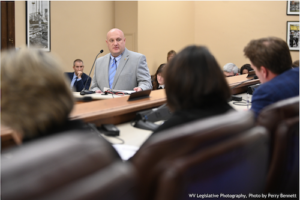by Erin Beck, Kids’ Health Correspondence
It’s too soon to say whether giving a managed care organization oversight of the health of kids in state custody will help those kids, according to a West Virginia Department of Health and Human Resources official.
Jeff Pack, who prioritized foster care bills during his time representing Raleigh County in the Legislature, became the commissioner of DHHR’s newly created Bureau for Social Services in August.
Legislators held interim meetings earlier this week. In a presentation before the Joint Committee on Health and Human Resources Accountability Tuesday, Pack told lawmakers it’s too soon to say whether the managed care organization selected, Aetna, will meet kids’ needs. He also said DHHR and Aetna are experiencing “growing pains.”
In 2019, the West Virginia Department of Health and Human Resources officials pitched giving a managed care organization oversight over the about 7,000 kids in foster and kinship care in West Virginia. They said they needed help with the overwhelming number of kids in custody of the state, noting that West Virginia has the highest rate of child removals in the country.
They also said that as kids are shuffled throughout the state, medical records are lost, and kids change providers frequently. DHHR Deputy Secretary Jeremiah Samples said a managed care organization could prevent that and provide some consistency for kids whose lives are already unstable.
DHHR and legislators said moving the population under an MCO umbrella would be one way to address the ongoing foster care crisis.
Foster children in West Virginia are covered by Medicaid. According to Medicaid.gov, states pay those organizations to reduce Medicaid costs while aiming to improve healthcare quality.
During the meeting Tuesday, Senator Rich Lindsay, D- Kanawha, asked Pack for an example of the “growing pains.”
“I think — and this is anecdotal, but we’re going to start trying to keep some data on this — I think many of our field workers don’t have an understanding of how to utilize them or what it is they can and cannot do or should or should not do,” Pack said. “I have met with Aetna as our MCO for our foster care population several times, and I have gently encouraged them to go out and make contact in our local offices and do face-to-face trainings over and over again until our people understand how to engage them. I think right now, in their defense, they seem to be making an effort at that.
“I don’t know that maybe we - perhaps our expectations of what they could do are different than what they really are, or perhaps their understanding of what our expectations of them were was flawed.
He said it was “premature this early on to pass judgment.
“I think a year from now, you could say this is working, or we see that we’re trending in the right direction,” he said.
House of Delegates Majority Leader Amy Summers, R- Taylor, said she knew Pack “wouldn’t want to comment on this out loud,” but asked him whether problems were with the company or the concept.
“I think it’s a little bit of both,” he said.
Pack said he had supported the bill to place foster kids under managed care, House Bill 2010, in part because lawmakers were told a national company would have the leverage to influence the construction of residential treatment facilities and reimbursement rates.
“The jury’s probably still out on that,” he said.
Summers noted that the state can end contracts, although in 2019, Samples said state officials were moving the population into managed care with or without the support of the Legislature.
Some child advocates had worried a managed care organization would deny care to cut costs, but Marissa Sanders, who leads the West Virginia Foster, Adoptive & Kinship Parents Network, said Wednesday she hasn’t heard of that happening yet.
Abuse and neglect
Also Tuesday, Delegate Mike Pushkin, D- Kanawha, asked Pack about a Mountain State Spotlight investigation that found the state kept kids at out-of-state facilities even after kids were abused.
Pack said he didn’t know why that happened and, under questioning from Pushkin, also said he didn’t know where those kids are now or if they’ve been given adequate support since then. He noted it was before his time.
“I can’t speak intelligently about that,” he said.
Also Tuesday:
- Pack said the vacancy rate for child protective services workers is 27 percent. He said retention is more difficult than recruitment. According to exit surveys, the vast majority leave over the salary — around $30,000.
- He asked lawmakers to consider the needs of kids who will still need services after aging out of the system.
- Pack said part of the reason kids end up in state custody is the lack of mental health resources in rural areas.
- Pack said there aren’t enough family placements for kids. But under questioning from Pushkin, he also confirmed that because of an outdated DHHR computer system, workers lack access to information about placement options throughout the state.





0 Comments